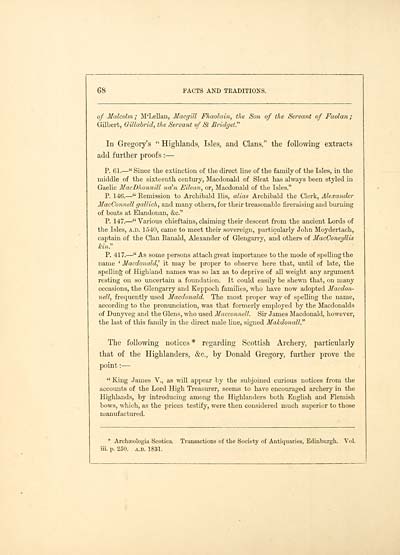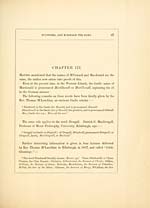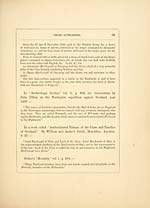Facts and traditions collected for a family record
(80) Page 68
Download files
Complete book:
Individual page:
Thumbnail gallery: Grid view | List view

68 FACTS AND TRADITIONS.
of Malcolm; M'Lellan, Macgitt Fhaolain, the Son of the Servant of Faolan;
Gilbert, Gillabrid, the Servant of St Bridget."
In Gregory's " Highlands, Isles, and Clans," the following extracts
add further proofs : —
P. 61. — " Since the extinction of the direct line of the family of the Isles, in the
middle of the sixteenth century, Macdonald of Sleat has always been styled in
Gaelic MacDlionuill na'n Eilean, or, Macdonald of the Isles."
P. 146. — " Remission to Archibald His, alias Archibald the Clerk, Alexander
MacConnell gallich, and many others, for their treasonable fireraising and burning
of boats at Elandonan, &c."
P. 147. — " Various chieftains, claiming their descent from the ancient Lords of
the Isles, a.d. 1540, came to meet their sovereign, particularly John Moydertach,
captain of the Clan Ranald, Alexander of Glengarry, and others of MacConeyllis
kin."
P. 417. — "As some persons attach great importance to the mode of spelling the
name ' Macdonald] it may be proper to observe here that, tintil of late, the
spelling of Highland names was so lax as to deprive of all weight any argument
resting on so uncertain a foundation. It coidd easily be shewn that, on many
occasions, the Glengarry and Keppoch families, who have now adopted Macdon-
nell, frequently used Macdonald. The most proper way of spelling the name,
according to the pronunciation, was that formerly employed by the Macclonalds
of Dunyveg and the Glens, who used Macconnell. Sir James Macdonald, however,
the last of this family in the direct male line, signed Makdonall."
The following notices * regarding Scottish Archery, particularly
that of the Highlanders, &c, by Donald Gregory, further prove the
point : —
" King James V., as will appear by the subjoined curious notices from the
accounts of the Lord High Treasurer, seems to have encouraged archery in the
Highlands, by introducing among the Highlanders both English and Flemish
bows, which, as the prices testify, were then considered much superior to those
manufactured.
* Archajologia Scotica. Transactions of the Society of Antiquaries, Edinburgh. Vol.
iii. p. 250. a.d. 1831.
of Malcolm; M'Lellan, Macgitt Fhaolain, the Son of the Servant of Faolan;
Gilbert, Gillabrid, the Servant of St Bridget."
In Gregory's " Highlands, Isles, and Clans," the following extracts
add further proofs : —
P. 61. — " Since the extinction of the direct line of the family of the Isles, in the
middle of the sixteenth century, Macdonald of Sleat has always been styled in
Gaelic MacDlionuill na'n Eilean, or, Macdonald of the Isles."
P. 146. — " Remission to Archibald His, alias Archibald the Clerk, Alexander
MacConnell gallich, and many others, for their treasonable fireraising and burning
of boats at Elandonan, &c."
P. 147. — " Various chieftains, claiming their descent from the ancient Lords of
the Isles, a.d. 1540, came to meet their sovereign, particularly John Moydertach,
captain of the Clan Ranald, Alexander of Glengarry, and others of MacConeyllis
kin."
P. 417. — "As some persons attach great importance to the mode of spelling the
name ' Macdonald] it may be proper to observe here that, tintil of late, the
spelling of Highland names was so lax as to deprive of all weight any argument
resting on so uncertain a foundation. It coidd easily be shewn that, on many
occasions, the Glengarry and Keppoch families, who have now adopted Macdon-
nell, frequently used Macdonald. The most proper way of spelling the name,
according to the pronunciation, was that formerly employed by the Macclonalds
of Dunyveg and the Glens, who used Macconnell. Sir James Macdonald, however,
the last of this family in the direct male line, signed Makdonall."
The following notices * regarding Scottish Archery, particularly
that of the Highlanders, &c, by Donald Gregory, further prove the
point : —
" King James V., as will appear by the subjoined curious notices from the
accounts of the Lord High Treasurer, seems to have encouraged archery in the
Highlands, by introducing among the Highlanders both English and Flemish
bows, which, as the prices testify, were then considered much superior to those
manufactured.
* Archajologia Scotica. Transactions of the Society of Antiquaries, Edinburgh. Vol.
iii. p. 250. a.d. 1831.
Set display mode to:
![]() Universal Viewer |
Universal Viewer | ![]() Mirador |
Large image | Transcription
Mirador |
Large image | Transcription
Images and transcriptions on this page, including medium image downloads, may be used under the Creative Commons Attribution 4.0 International Licence unless otherwise stated. ![]()
| Histories of Scottish families > Facts and traditions collected for a family record > (80) Page 68 |
|---|
| Permanent URL | https://digital.nls.uk/95521945 |
|---|
| Description | A selection of almost 400 printed items relating to the history of Scottish families, mostly dating from the 19th and early 20th centuries. Includes memoirs, genealogies and clan histories, with a few produced by emigrant families. The earliest family history goes back to AD 916. |
|---|

